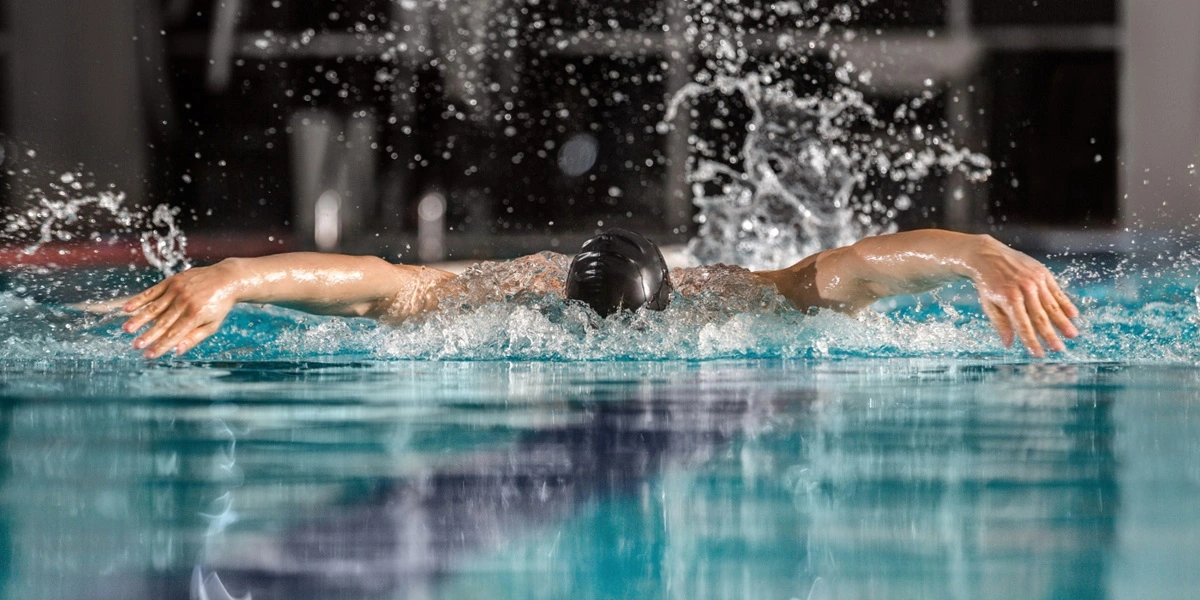Is Swimming Good for Weight Loss?

As famously said by Oprah Winfrey, “The only way to effectively achieve your goals is to take action.”
Many of us dream of losing weight, feeling lighter, and living healthier lives. But finding the right exercise can be challenging. If you’re looking for a fun and effective way to shed those extra kilos, swimming might be the answer.
Let’s explore why swimming is great for weight loss and how you can make the most of it.
How Does Swimming Help You Lose Weight?
Swimming is a full-body workout. Every stroke works your arms, legs, and core, helping to tone muscles and burn calories.
Because water provides resistance, swimming can be more challenging than other exercises, leading to more calories burned, which can lead to weight loss. Not only that, swimming is a great exercise for your heart, too, helping improve heart health and increase endurance.
Now, let’s dig a little deeper into what makes swimming an effective exercise for weight loss.:
1. Caloric Burn
Swimming is a high-calorie-burning activity. Depending on the intensity and stroke used, a person can burn between 180 to 420 calories in 30 minutes.
For example, vigorous swimming can burn approximately 360 calories for a person weighing around 70 kg, comparable to running at a moderate pace.
| Physical Activities | Calories Burned in 30 min | ||
| 57 Kg Person* | 70 Kg Person* | 84 Kg Person* | |
| General Swimming | 180 | 216 | 252 |
| Vigorous Swimming | 300 | 360 | 420 |
| Running: 8 km/hr (12 min/km) | 240 | 288 | 336 |
| Running: 9.7 km/hr (10 min/km) | 495 | 360 | 420 |
| *Approximate weight | |||
2. Full-Body Workout
Swimming engages multiple muscle groups, including the arms, legs, core, and back. This total body engagement increases heart rate and metabolism, contributing to greater calorie expenditure during and after the workout.
3. Low-Impact Exercise
Swimming is easier on the joints than high-impact exercises like running. This makes it suitable for individuals with injuries or those who are overweight, allowing them to exercise without causing additional strain on their bodies.
4. Increased Metabolism
Regular swimming can boost your metabolism, increasing calorie burn. This metabolic enhancement is beneficial for weight management and overall fitness.
5. Variety of Intensity
Swimming allows for varying workout intensities. Interval training, alternating between high and low intensity, can enhance calorie burn and improve cardiovascular fitness.
For instance, mixing different strokes or swimming speeds can make workouts challenging and effective.
6. Complementary to Diet
For effective weight loss, swimming should be combined with a healthy diet. Creating a calorie deficit, burning more calories than consumed, is essential for losing weight.
While swimming helps burn calories, attention to nutrition is crucial for achieving weight loss goals.
Is your weight increasing your health riskHealthy Weight
Calculator
How Much Weight Can You Lose Swimming?
The weight you can lose through swimming depends on your weight, swimming intensity, duration, and diet. Here’s how swimming helps with weight loss:
Caloric Burn from Swimming
Swimming is an effective way to burn calories. Whether you swim at a moderate or vigorous pace, you can burn a lot of calories.
The amount depends on your weight, swim intensity, and stroke type. Moderate freestyle burns many calories, while vigorous swimming, especially with challenging strokes, burns even more.
For example, to lose 0.5 kg, you need to burn about 3,500 calories as long as your diet remains healthy and consistent.
Factors Influencing Weight Loss
1. Current Weight:
Heavier individuals tend to burn more calories. For example, a person weighing 84 kg may burn more calories than a person weighing 57 kg during the same swimming session.
2. Swimming Intensity
More demanding strokes, like the butterfly, burn more calories than gentler strokes. Vigorous swimming can significantly increase calorie burn in a short amount of time.
How Long Should You Swim to Lose Weight?
Consistency is key to seeing weight loss results. Aim to swim at least three to four times a week, with each session lasting around 30 to 60 minutes. Start with a manageable time and gradually increase as your stamina improves.
For effective weight loss through swimming, consider these tips:
Recommended Duration
-
Minimum Time: Aim for 150 minutes of moderate swimming per week. This can be split into 30-minute sessions most days of the week.
-
Higher Intensity: For better results, swim vigorously for 75 minutes per week. But never push yourself if you are feeling tired or your body is giving you signals to stop.
Frequency
Swim four to five times a week to maintain a calorie deficit and aid weight loss.
What Should be the Routine of Swimming for Weight Loss?
Creating a swimming routine can keep you motivated and ensure you work out effectively. Here’s a simple plan to get you started:
- Warm-Up: Begin with a gentle swim to get your muscles ready.
- Main Set: Alternate between different strokes like freestyle, backstroke, and breaststroke. Include intervals where you swim fast for a short period and then slow for another period.
- Cool Down: Finish with a relaxed swim to help your body recover.
Some Important Things to Keep in Mind When Swimming
To make your swimming routine effective and enjoyable, here are some things you should remember:
1. Stay Hydrated
It’s easy to overlook hydration when you’re surrounded by water, but remember, you sweat as you swim. Make it a habit to drink water before and after your sessions to stay hydrated.
2. Balanced Diet
While swimming does help burn calories, it’s only one part of the weight loss equation. Complement your swimming with a balanced diet.
Pack a healthy snack like a fruit, some nuts, or, a homemade no-sugar energy bar to refuel after swimming, preventing the temptation to indulge in less healthy options.
3. Listen to Your Body
If you’re feeling tired or sore, take it as a sign to ease up. It’s better to skip a day or adjust your intensity than to push through pain and risk an injury.
What type of Swimming Exercises You Can Try?
Mix up your routine with these practical exercises to keep your swims engaging and effective:
1. Freestyle Intervals
This is perfect for a busy schedule. Swim as fast as you can for a short burst, then slow down to recover. This kind of high-intensity interval training can fit into a shorter session while still offering significant benefits.
2. Kickboard Drills
3. Pull Buoy Work
Great for focusing on upper body strength without straining your legs, this exercise involves placing a pull buoy between your thighs and using only your arms to swim. It’s a fantastic way to end your swim if your legs are feeling the burn from previous exercises.
How We At Fitterfly Can Help You?
Swimming is a great activity, but it’s not always enough for weight loss. Many Fitterfly members have told us they used to love swimming but stopped because of weight gain. Our fitness coaches understand this and create personalized exercise plans that work with your current condition.
That’s why we combine different forms of exercise like strength training and yoga. Strength training builds muscle and boosts your metabolism, while yoga enhances flexibility, reduces stress, and strengthens your body.
At Fitterfly, we also provide a balanced diet plan to help you lose weight and stay healthy. Our comprehensive routine helps you shed extra fat, tone your muscles, and feel healthier and fitter.
Give us a missed call at 08068507599 to talk to our program advisors and see how we can help you achieve your weight loss goals.
Lost 12 kg in 3 months without tough diet restrictions!


65kg
Happy members
EMI
Guarantee
4.8/5
Weight Loss Program
This blog provides general information for educational and informational purposes only and shouldn't be seen as professional advice.
Frequently Asked Questions
How to Integrating Swimming Into Your Routine?
Consider swimming in the morning if your schedule allows. Starting your day with a swim can boost your metabolism and leave you feeling energized for the day ahead. Plus, it's a peaceful time at many pools before the crowds arrive.



















